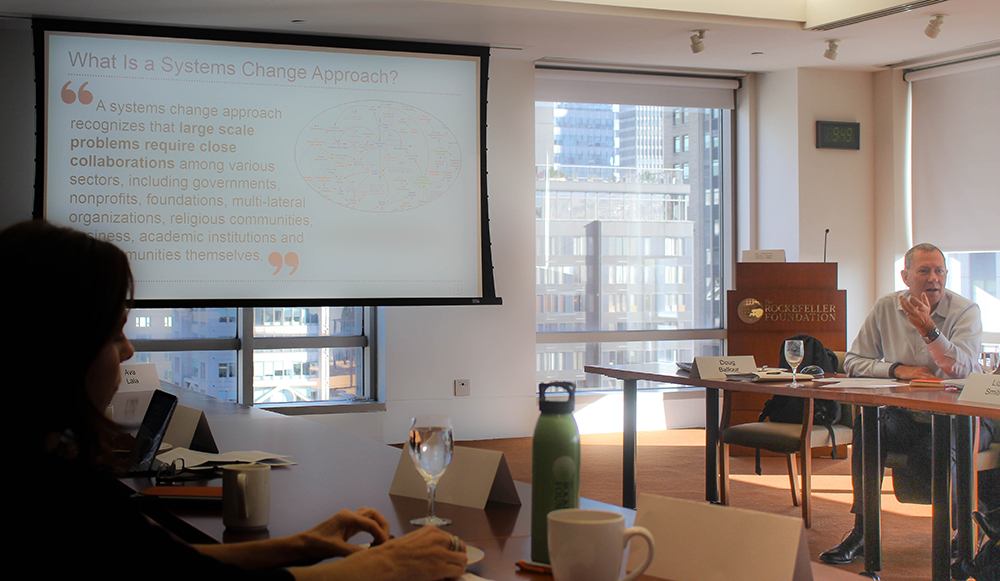The objective was to share our perspective on what makes for a successful systems entrepreneur and hear from other leaders in the social sector based on their experiences.
With both funders and systems entrepreneurs—representing a range of international and domestic issues—in attendance, we had a diverse set of opinions and experiences in the room. Three case studies—from The Rockefeller Foundation, B Lab, and EYElliance—helped highlight how each organization was bringing about systemic change in their own unique way.

During the discussion, three questions generated some of the most animated debate:
Is “systems entrepreneur” the right term?
Several people questioned whether the use of “entrepreneur” was a misnomer. By definition, “entrepreneur” refers to an individual. Yet there are many organizations acting as systems change agents. Several people felt that the nonprofit community tends to gravitate towards and elevate charismatic individual leaders instead of organizations, and there was concern that this term could reinforce the idea that only individuals can drive this type of change.
Additionally, entrepreneurship conveys a sense that something new is created. But in the case of systems change, it’s often about harnessing and channeling the work that’s already being done by others instead of creating a new solution or intervention.
But while some felt that the use of the word entrepreneur wasn’t an accurate description, others felt that it was helpful vernacular.
First, it provides a useful counterbalance to the term social entrepreneur, which has become widely understood and adopted. While a social entrepreneur focuses one aspect within the framework of a complex problem, a systems entrepreneur is trying to change the dynamics of the entire system.

Another attendee argued that even though a systems entrepreneur might not create a new solution, the “newness” comes from seeing that a system can be changed and taking initiative. Systems entrepreneurs present a vision and bring about a change that wouldn’t otherwise happen, which is very much in line with the entrepreneur ethos.
Can a systems entrepreneur be neutral?
In discussing the characteristics that systems entrepreneurs need to have to be successful, being a neutral facilitator was one key attribute. However, several people raised doubts over whether anyone could be truly neutral. One attendee argued that if you are advocating for change, that in and of itself isn’t a neutral position.
Another participant remarked that many funders come to the table viewing themselves as a neutral party, but because they hold the purse strings, they aren’t entirely neutral. For these reasons, the group ultimately decided that a better requirement was that a systems entrepreneur needs to be independent.
To put the neutral versus independent semantics in perspective, Liz Smith, the co-founder of EYElliance, explained how her organization navigates that balance. Their coalition includes over 20 organizations, some of which conduct school-based eye health interventions. Because the issue of incorporating eye-care initiatives in schools is something they advocate for, they are not neutral on that position. However, those organizations have different approaches to how they implement school-based eye health interventions, making it tricky for EYElliance to advocate for one approach over the other. In that regard, they have thus far remained independent on how best to implement school-based initiatives.
Can you be both a social entrepreneur and a systems entrepreneur?
We know several organizations that are grappling with which type of organization they are—and wondering if it’s possible to be both. Our group agreed that one of the most important characteristics of a systems entrepreneur is the ability to build trust and be an “honest broker.”
Some attendees thought that an organization’s credibility and trustworthiness would be diminished by trying to be both a systems and social entrepreneur, yet others thought it was possible to pull off. One potential solution that arose was to have a small group of systems thinkers within a larger organization; operating as “intrapreneurs,” their distinct mission and sense of separation might be the ideal way for an organization to balance both strategies.
None of us in the room had all the answers, which is why the varying perspectives were so illuminating. Our goal is to help others figure out the best ways to bring about systemic change, and by bringing together different groups and learning from others, we can offer our clients a more diverse set of insights, recommendations, and connections.
We’d love to hear your perspectives on some of the above questions we debated—and others we should explore. If you’re interested in participating or getting updates about future events or research, please contact me at [email protected].
